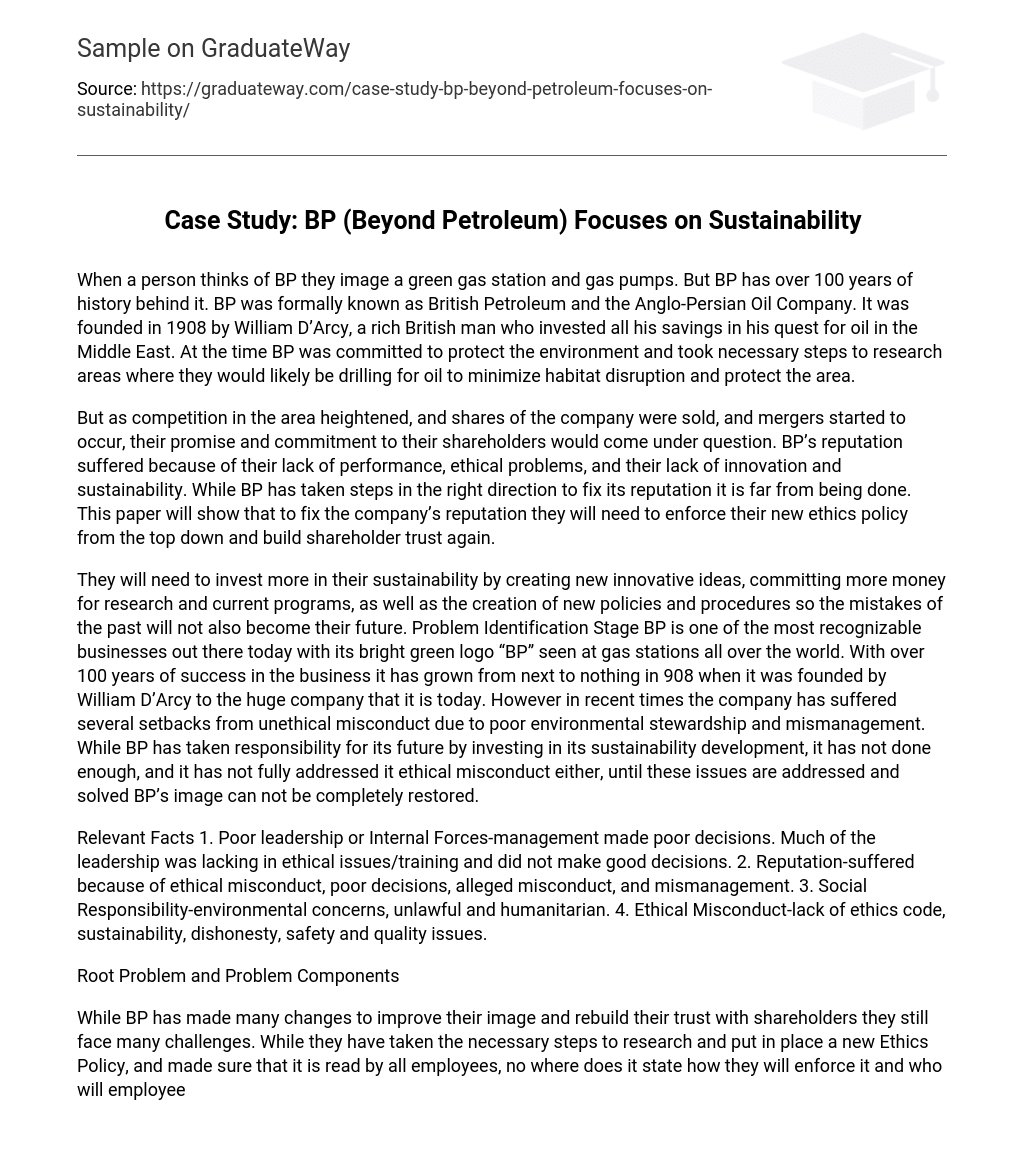BP is often associated with a green gas station and gas pumps, but it has a rich history of over 100 years. Originally known as British Petroleum and the Anglo-Persian Oil Company, it was established in 1908 by William D’Arcy, a wealthy British individual who dedicated his entire savings to the pursuit of oil in the Middle East. From the start, BP prioritized environmental conservation and took proactive measures to study potential oil drilling sites to minimize habitat disruption and safeguard the area.
With increased competition, BP’s shares were sold and mergers occurred. This raised doubts about the company’s promise and commitment to shareholders. BP’s reputation suffered due to poor performance, ethical problems, and lack of innovation and sustainability. Although some efforts have been made to improve its reputation, BP still has a significant journey ahead. This paper will show that restoring the company’s reputation requires implementing a new ethics policy from upper management and rebuilding trust with shareholders.
BP should increase its investment in sustainability by generating innovative ideas, allocating more funds to research and existing programs, and implementing new policies and procedures to avoid repeating past mistakes. BP is widely recognized today during the problem identification stage primarily because of its bright green logo “BP” seen at gas stations worldwide. This multinational corporation has achieved great success over a century since its humble beginnings in 1908 with William D’Arcy as its leader. However, recent times have seen several setbacks due to unethical behavior resulting from inadequate environmental stewardship and mismanagement. Although BP acknowledges the need for sustainable development, it falls short in taking sufficient action to address the lingering consequences of its ethical misconduct. Until these issues are effectively tackled and resolved, BP’s image cannot be fully restored.
Key Points:
1. Inadequate leadership and poor decision-making due to lack of ethical training.
2. Reputation damage caused by ethical misconduct, alleged wrongdoing, and mismanagement.
3. Social responsibility issues including environmental concerns and violation of laws and humanitarian principles.
4. Ethical misconduct involving absence of ethics code, lack of sustainability, dishonesty, and problems with safety and quality.
Root Problem and its Components
Despite making several changes to enhance their reputation and regain shareholders’ trust, BP is still confronted with numerous challenges. Although they have implemented a new Ethics Policy, ensuring that all employees read it, there is no mention of the mechanisms for its enforcement or the designated individuals for reporting potential issues. Furthermore, while they have allocated resources to sustainability and diversified their investments in innovation and research, their level of commitment remains insufficiently demonstrated.
Another reason for the decline in BP’s reputation was a lack of effective leadership. Top management made decisions to disregard environmental safety regulations and the well-being of people. The management team lacked ethics training and the ability to address crucial issues. Two possible alternatives to address this situation are: 1) Taking no action assuming that the problems have been resolved and 2) Assessing leadership ethics, problem-solving skills, values that will benefit all stakeholders, and integrity.
3. Increase investment in research, cleaner energy, and environmental programs to support sustainability.
4. Create an Ethics policy committee responsible for training and enforcing ethical guidelines.
Evaluating Alternatives:
- Taking no action will not solve the problems and could lead to further issues down the line.
- Leadership- While the current leader or CEO has effectively guided the company, it is important to verify their ethical training and integrity to maintain the company’s progress.
3. By investing more money in specific areas, the company can both promote sustainability and fulfill stockholders’ desires. Nevertheless, this measure alone will not completely resolve all of the company’s problems.
4. In order to address most of the company’s issues, it is imperative to establish an Ethics Committee. This committee would oversee employees’ conduct and enforce company policies to guarantee compliance with ethical standards and uphold integrity.
Hence, the absence of an Ethics Committee to enforce the company’s code of ethics is the primary concern that requires immediate attention.
By implementing an Ethics Committee, the company can ensure that all individuals, from top executives to employees at every level, are informed about the expectations and repercussions associated with violating company policies. This initiative will enhance the CEO’s role as a leader committed to ethical behavior and handling ethical issues. Moreover, it ensures that safety, health, environmental matters, and stakeholder concerns receive proper attention.
BP can enhance their reputation by investing more money into their sustainability program, specifically by committing to wind, solar, biofuels, and carbon sequestration and storage. In addition, they should consider extending the distribution of their Carbon Footprint Toolkits to other countries. These actions will not only enhance their reputation but also benefit their stockholders.





